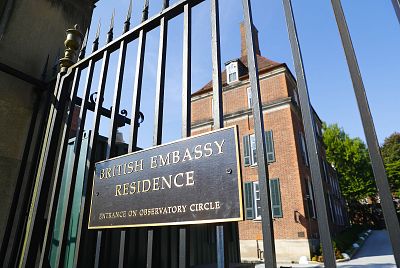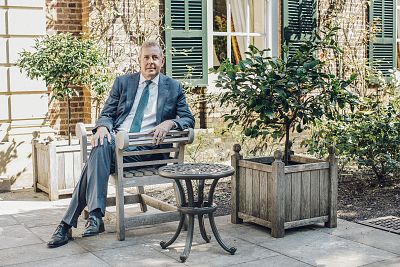Trump has "consistently disparaged the U.K. and shown disrespect," according to a former British ambassador to the U.S.
LONDON — It sent shock waves through diplomatic corps and is the subject of an ongoing debate about the impartiality of civil servants.
But the scandal that forced the U.K. ambassador to Washington to step down this week showed something else: how the so-called special relationship between the United States and the United Kingdom is weakening.
Sir Kim Darroch, a highly respected career diplomat, announced his departure from Washington on Wednesday after cables in which he called President Donald Trump "insecure" and "incompetent" were leaked to the media.
Darroch had spent four years and three days as Britain's most senior diplomat, a tenure effectively ended by the president's withering assessment of him as "wacky," "very stupid," and "a fool," in a series of tweets sent after the leak was published.
Trump's intervention horrified British civil servants and raised fears that impartial diplomats may increasingly be drawn into a political landscape growing ever more polarized.
Sir Nigel Sheinwald, the British ambassador to the U.S. between 2007 and 2012, told NBC News that Trump had "consistently disparaged the U.K. and shown disrespect, even at the same time he called it the greatest relationship ever known."
That special relationship, forged after World War II and cemented with various bilateral agreements on security and military cooperation, has in fact been in decline for some time and is being made worse by the U.S. president, Sheinwald said.
"The British-American relationship has a huge amount of depth, centuries of trade and economic ties, all of which have become more advantageous to both countries after the Second World War," he said.
"Historically the relationship has been in decline for a number of years and it's under particular pressure because of President Trump and because of Brexit," he said, referring to the U.K.'s 2016 vote to leave the European Union. "The net effect of the Trump administration has been to downgrade the importance of alliances."
All the recent former diplomats NBC News spoke to were concerned that civil servants are increasingly being drawn into the political arena and having their views questioned in public. This week, the British pro-Brexit politician and Trump confidant Nigel Farage called Darroch a "globalist" who was politically opposed to the current U.S. administration and called for his replacement.
Trump has suggested that Farage would be a good ambassador. Farage has said he is "not the right man for the job," although he has made clear he would serve U.K.-U.S. relations in some way.
The idea that a foreign leader may even partly dictate the choice of ambassador has already prompted alarm among British officials.
Not only that, the much-imitated British model of career diplomats being posted to key foreign cities — rather than political allies or financial backers of government figures — was at risk, according to Sheinwald.
"What you need is people who are qualified for the job and who follow the instructions of the government of the day," he said. "You don't want people who are ideologically aligned to yourself. We've got to get away from that idea of them and us. The civil service, the diplomatic service, represent everyone."
He added: "This episode has been a shock to the confidence of the public service, but I think the situation can be redeemed if we learn the lesson of this entire episode and we return to the sort of civil service values that Kim Darroch talked about in his resignation letter and which are frankly under siege at the moment."
Darroch said in his letter that "the professionalism and integrity of the British civil service is the envy of the world. I will leave it full of confidence that its values remain in safe hands."
The current U.S. ambassador to the U.K. is Woody Johnson, the billionaire businessman and philanthropist, who has personally given more than $1 million to Republican causes and candidates and has raised millions more.
Jennifer Cassidy, a former diplomat for the Republic of Ireland and the European Union and now a lecturer at Oxford University, said there was a motive to Trump's apparently improvised tweets — to undermine rivals and give a boost to those who might be sympathetic to him.
"If you look at Trump's tweets, the first line was about the ambassador but then he uses his platform to say he's no fan of Theresa May, to tear down the U.K. and its policies," she told NBC News.
"He said that with the next PM to come, there would be a change in tone — we think it's talking off the cuff but I think it's way more strategic than that."
Commentators in the U.K.have speculated that Darroch's cables were leaked because of his anti-Trump, anti-Brexit stance — he spent several years in London and Brussels as one of the most senior British diplomats responsible for the country's relationship with the European Union.
"He's tearing down an ambassador who was anti-Trump, who was anti-Brexit, he's going after Theresa May, and he's speaking highly of Boris Johnson and Nigel Farage. That's what's worrying," Cassidy said.
Johnson is one of two men vying for the job of leader of the ruling Conservative party in the U.K., who would then become prime minister. He was heavily criticized for failing to say he would keep Darroch in the Washington job until his scheduled departure at the end of the year.
There's another problem diplomats deal with these days: Being dragged into the spotlight.
Increasingly, ambassadors and embassies use social media to explain and inform people in their host nations what they are doing — something that has the potential to create goodwill but also increase scrutiny and political attacks on individuals.
"That wasn't the role of diplomats previously. It was secretive, behind closed doors and you were having meetings with politicians and people and reporting it back. But it's a lot more out in the open now," said Craig Morley, a strategy adviser at the University of Oxford and previously a senior British diplomat working in China.
"In the U.K. we're used to civil servants not being in the limelight, so if you've got diplomats out there building up a public profile and a social media profile, they are a lot more exposed in terms of their opinions and what they say."













